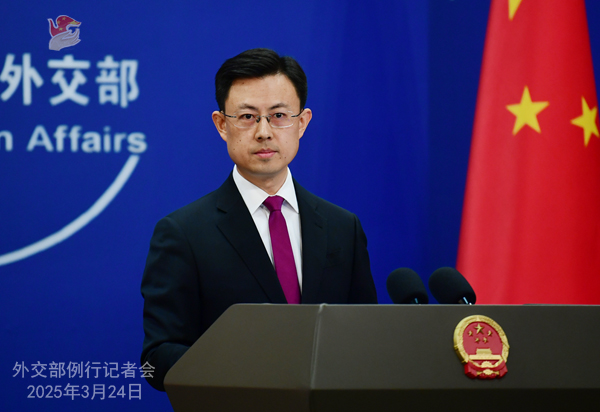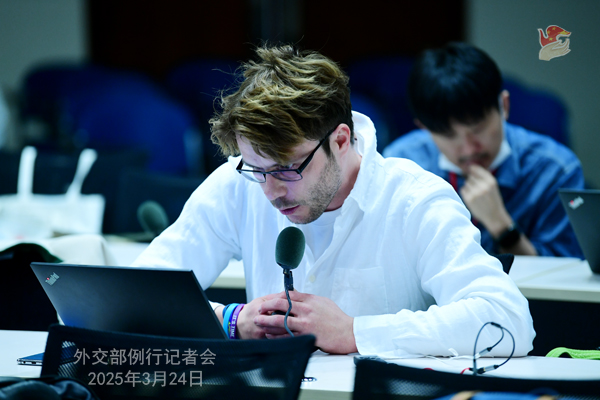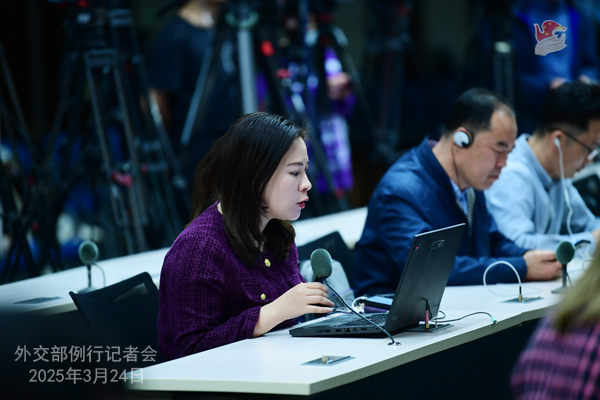
Member of the Standing Committee of the Political Bureau of the CPC Central Committee and Vice Premier of the State Council Ding Xuexiang will attend and deliver a keynote speech at the opening plenary of the Boao Forum for Asia Annual Conference 2025 in Hainan on March 27 at the invitation of the Forum.
At the invitation of Member of the Political Bureau of the CPC Central Committee and Minister of Foreign Affairs Wang Yi, French Minister for Europe and Foreign Affairs Jean-Noël Barrot will visit China from March 27 to 28.
China News Service: Foreign Minister Wang Yi recently attended the China-Japan-ROK Trilateral Foreign Ministers’ Meeting and co-chaired the China-Japan High-Level Economic Dialogue in Japan. Can you share information on that?
Guo Jiakun: We have released readouts, which you may refer to. While he was in Japan, Foreign Minister Wang Yi attended the 11th China-Japan-ROK Trilateral Foreign Ministers’ Meeting and held the China-Japan High-Level Economic Dialogue six years after the previous one. He also met with Japanese Prime Minister Shigeru Ishiba, ROK Foreign Minister Cho Tae-yul and others. The visit was a success.
The foreign ministers of China, Japan and the ROK had in-depth exchanges of views on the trilateral cooperation and regional and international issues. They agreed that it’s important to uphold the momentum of trilateral cooperation, advance practical cooperation on all fronts, expand cooperation areas, deepen cultural and people-to-people exchange, and work for more outcomes that benefit the people of the three countries and the wider region.
China and Japan agreed to follow through on the important common understandings between President Xi Jinping and Prime Minister Shigeru Ishiba in their meeting in Lima, fully advance the China-Japan strategic relationship of mutual benefit, step up exchanges and cooperation in various fields, and work for the steady and sustained development of the bilateral relations. Fifteen government departments from the two sides attended the high-level economic dialogue. They had in-depth communication on macro policies, trade and investment, digital economy, green development, ecological conservation, cultural and people-to-people exchanges and regional cooperation. They also made plans for cooperation going forward and reached 20 common understandings.
As a Chinese saying goes, close neighbors are better than relatives far away. In a world with notably rising uncertainties and instabilities, China stands ready to work with Japan and the ROK to enhance mutual trust, deepen cooperation, resist disruption, and together contribute to regional and global peace and prosperity.
AFP: Chinese Premier Li Qiang met with U.S. Senator Steve Daines on Sunday and said that Beijing and Washington should choose dialogue over confrontation. Following this meeting, can the Foreign Ministry give us any more details on what would be the next step in dialogue between the U.S. and China?
Guo Jiakun: China has released a readout on the meeting, which you may refer to. China believes that the steady, sound and sustainable development of China-U.S. relations serves the common interests of both peoples and meets the shared aspiration of the international community.
Global Times: Foreign Minister Wang Yi met with Prime Minister Shigeru Ishiba, Foreign Minister Takeshi Iwaya, and some other Japanese political figures when he attended the China-Japan-ROK Trilateral Foreign Ministers’ Meeting and co-chaired the China-Japan High-Level Economic Dialogue in Japan. According to China’s readouts, Foreign Minister Wang Yi made clear during the meetings China’s position and concerns on the issue of history. He stressed that the Japanese side should hold a correct perception of and attitude on history. Could you share with us more details on China’s principled position on this issue?
Guo Jiakun: As Foreign Minister Wang Yi said, the issue of history bears on the political foundation of China-Japan relations as well as people’s sentiments in China and other Asian countries victimized by Japanese aggression during the war. Having a correct perception of and attitude on history is an important prerequisite for Japan’s return to the international community after World War II, the political foundation of Japan’s relations with neighboring countries, and more importantly, an important yardstick for Japan’s commitment to peaceful development. This year marks the 80th anniversary of the victory in the Chinese People’s War of Resistance Against Japanese Aggression and the World Anti-fascist War. History, if not forgotten, can serve as a guide for the future. To bear in mind the history during the last century is not for perpetuating hatred but for cherishing the hard-won peace and creating a bright future.
The four political documents between China and Japan established the important political principle of “seeing history as a mirror and looking ahead to the future”, and Japan made serious political commitments. We hope the Japanese side will earnestly draw lessons from history, have a strong sense of responsibility to history, people and the future, make a clean break with the moves of whitewashing the history of aggression, follow the path of peaceful development, and take concrete actions to earn the trust of its Asian neighbors and the international community.

Polish Press Agency: The German media outlet Welt am Sonntag has reported Chinese diplomats are discussing in Brussels the possibility of its participation in a potential peacekeeping contingent in Ukraine. Can you confirm that? Is China considering sending peacekeeping troops to Ukraine? What are the prerequisites for this decision?
Guo Jiakun: The report is not true at all. China’s stance on the Ukraine crisis is consistent and clear.
China Daily: We noted that days ago, the Group of Friends for Peace on the Ukraine crisis had a meeting again in New York and held a media stakeout. Could you share more details with us?
Guo Jiakun: The Group of Friends for Peace on the Ukraine crisis recently had a meeting in New York. They discussed the latest developments of the Ukraine crisis and the prospects for achieving a lasting peace. A media stakeout was held after the meeting, highlighting that the meeting was highly successful and reaffirming the resolution of the conflict through a negotiated political solution and diplomatic means. Members of the Group stressed that the conflict might be approaching a turning point and welcomed recent dynamics toward peace talks. They urged all stakeholders to play a constructive role, find a just and lasting solution—one that addresses concerns of the parties to the conflict and leads to a peace agreement acceptable to them. The Group will stay committed to maintaining close communication with all relevant parties, making the voices of the Global South heeded by more, and contributing to a peaceful resolution to the conflict and a better future for all.
Since its founding last September, under the guidance of the purposes and principles of the UN Charter, the Group of Friends for Peace on the Ukraine crisis has consistently advocated for an early peaceful resolution, and rallied positive forces for political settlement of the crisis. China will continue to work with the international community to make more rational voices for peace talks heard, create conditions for ending the conflict and promoting peace talks, build momentum and play an active and constructive role for the political settlement of the crisis.
CCTV: It’s reported that U.S. Senator Steve Daines said in an interview with Bloomberg on March 23 that he’d like to arrange a bipartisan delegation of U.S. senators to China later this year after David Perdue is confirmed as ambassador to the country. What’s China’s response?
Guo Jiakun: China welcomes more members of the Congress and American people from all walks of life to visit China so as to learn about China in a more objective way, and play a constructive role for the steady, sound and sustainable development of China-U.S. relations.
Shenzhen TV: To follow up on Foreign Minister Barrot’s visit to China, can you brief us on the program of the visit and China’s expectation?
Guo Jiakun: China and France celebrated the 60th anniversary of our diplomatic ties last year. President Xi Jinping’s successful state visit to France has led the bilateral ties onto a new journey and produced profound and positive impact internationally. The upcoming visit will be Foreign Minister Barrot’s first visit to China after coming into office. During his visit, Foreign Minister Wang Yi will hold talks with him to exchange views on following through on the two presidents’ common understandings, advancing China-France relations and China-EU relations, and other topics of common interest.
This year marks the 80th anniversary of the victory in the World Anti-Fascist War and the 80th anniversary of the establishment of the United Nations. The international landscape we are facing is an increasing mix of turbulence and transformation with rising instability and uncertainty. China and France are permanent members of the UN Security Council and each other’s comprehensive strategic partner. It is imperative for us to enhance strategic communication and contribute to world peace, stability and development. Through this visit, China hopes to work with France to consolidate political mutual trust, uphold openness and win-win, promote solidarity and coordination, safeguard multilateralism, jointly guard against the undertows of unilateralism and the law of the jungle, and inject more certainty to the world.

China Review News: According to what has been released by China’s Ministry of Foreign Affairs, while he was in Japan, Foreign Minister Wang Yi talked about the Taiwan question with Japanese political figures. He stressed that the four political documents between China and Japan have made clear provisions on the Taiwan question, which must be strictly implemented without ambiguity or backsliding. Can you further brief us on China’s stance?
Guo Jiakun: Taiwan is an inalienable part of China’s territory. The Taiwan question is at the core of China’s core interest, and bears on the political foundation of China-Japan relations and basic trust between the two countries.
This year marks the 80th anniversary of the recovery of Taiwan. Japan undeniably bears historical responsibilities on the Taiwan question. The Cairo Declaration issued by China, the U.S. and the UK in 1943 stated in explicit terms that Taiwan is a territory that Japan had stolen from the Chinese, and shall be restored to China. Article 8 of the Potsdam Proclamation jointly issued by China, the U.S., the UK and the Soviet Union in 1945 stipulates that the terms of the Cairo Declaration shall be carried out. On August 15, 1945, Japan accepted the Potsdam Proclamation and announced unconditional surrender. Later in 1972, Japan pledged in the China-Japan Joint Statement that it firmly maintains its position under Article 8 of the Potsdam Proclamation. The Treaty of Peace and Friendship Between China and Japan signed in 1978 clearly stated that the principles set out in the statement should be strictly observed. The treaty was deliberated and approved by the legislators of the two countries, and together with the China-Japan Joint Statement, constitute legally binding documents that provide guidance for the bilateral ties. The above-mentioned historical evidence and legal basis fully show that abiding by the one-China principle is the serious political commitment and obligation under international law that Japan must follow.
The false narrative, including “a Taiwan emergency is a Japanese emergency” and “the China-Japan Joint Statement is not legally binding”, will gravely erode the political foundation of China-Japan relations. Such narrative is not only wrong, but also very dangerous. We urge Japan to deliver on its commitment, handle the Taiwan question with extra prudence and take concrete actions to maintain the momentum of improvement and development in China-Japan relations.
AFP: I have a question about China Eastern Airlines Flight 5735 which crashed three years ago in Guangxi and killed 132 people on board. China’s civil aviation authority had issued statements on the probe into the crash on the first and second anniversaries. Are there any details you can provide on the ongoing investigation?
Guo Jiakun: I’d refer you to competent authorities for anything specific.
TVB: According to reports, information from sources shows that Rodrigo Duterte, former president of the Philippines, before being arrested by the International Criminal Court (ICC) applied for asylum in China but was allegedly rejected. The Philippine National Police’s Criminal Investigation and Detection Group (CIDG) preferred to arrest Duterte in Hong Kong, but the Hong Kong Police Force refused to cooperate with the International Criminal Police Organization since China is neither a state party nor a member state to the Rome Statute. What’s China’s comment? Can you confirm that Duterte sought asylum in China? If so, why did China reject the request?
Guo Jiakun: The Commissioner’s Office of China’s Foreign Ministry in the Hong Kong SAR has made a response on Mr. Rodrigo Duterte’s visit to Hong Kong. Relevant personnel in the Philippines also made remarks on that. Let me point out in particular that Mr. Duterte’s visit to Hong Kong was a private vacation trip. We have never received the so-called application for asylum to the Chinese government from former president Rodrigo Duterte or his family. We hope people from the media can be careful about the so-called “information from sources”, either unfounded or ill-motivated, and do not easily believe what they hear.